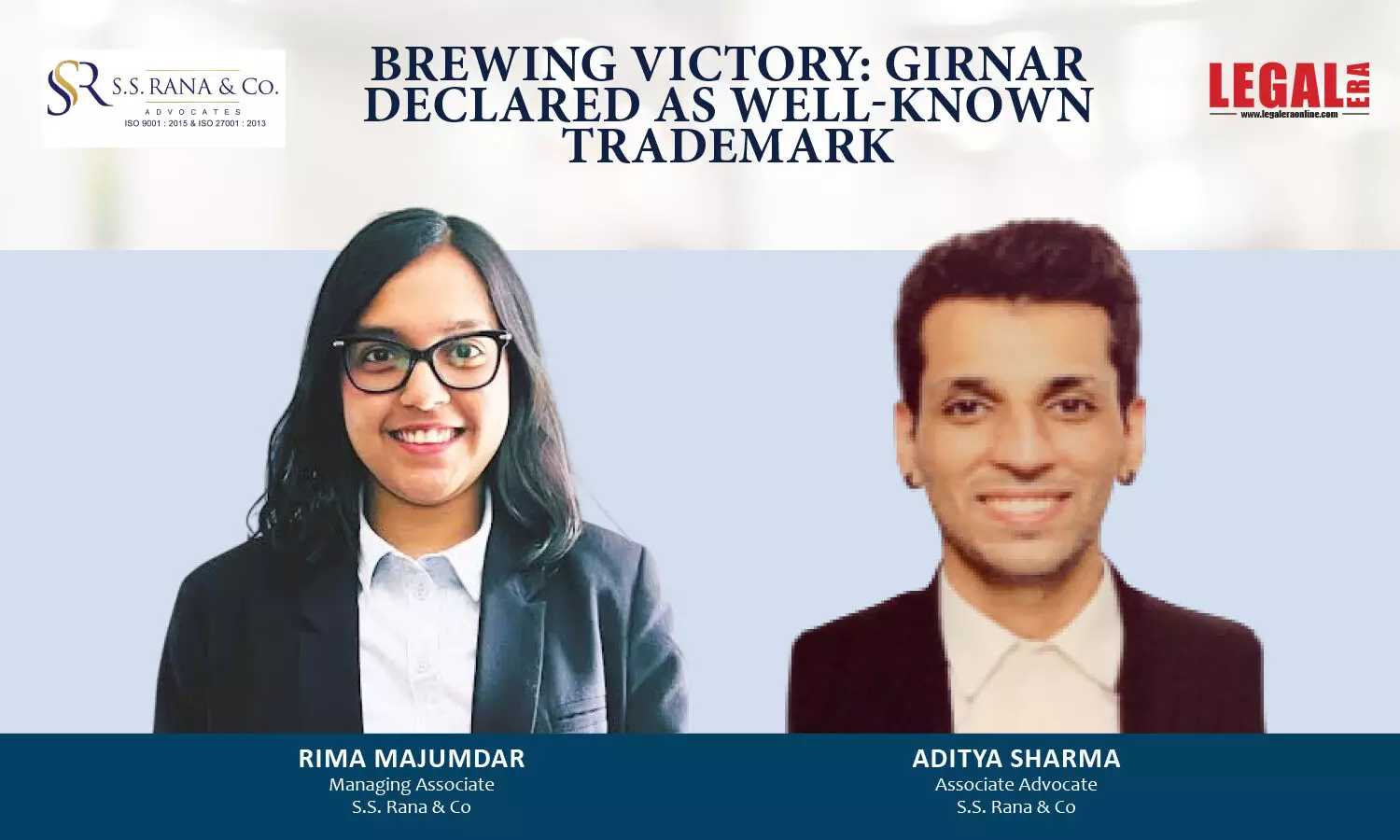- Home
- News
- Articles+
- Aerospace
- Artificial Intelligence
- Agriculture
- Alternate Dispute Resolution
- Arbitration & Mediation
- Banking and Finance
- Bankruptcy
- Book Review
- Bribery & Corruption
- Commercial Litigation
- Competition Law
- Conference Reports
- Consumer Products
- Contract
- Corporate Governance
- Corporate Law
- Covid-19
- Cryptocurrency
- Cybersecurity
- Data Protection
- Defence
- Digital Economy
- E-commerce
- Employment Law
- Energy and Natural Resources
- Entertainment and Sports Law
- Environmental Law
- Environmental, Social, and Governance
- Foreign Direct Investment
- Food and Beverage
- Gaming
- Health Care
- IBC Diaries
- In Focus
- Inclusion & Diversity
- Insurance Law
- Intellectual Property
- International Law
- IP & Tech Era
- Know the Law
- Labour Laws
- Law & Policy and Regulation
- Litigation
- Litigation Funding
- Manufacturing
- Mergers & Acquisitions
- NFTs
- Privacy
- Private Equity
- Project Finance
- Real Estate
- Risk and Compliance
- Student Corner
- Take On Board
- Tax
- Technology Media and Telecom
- Tributes
- Viewpoint
- Zoom In
- Law Firms
- In-House
- Rankings
- E-Magazine
- Legal Era TV
- Events
- Middle East
- Africa
- News
- Articles
- Aerospace
- Artificial Intelligence
- Agriculture
- Alternate Dispute Resolution
- Arbitration & Mediation
- Banking and Finance
- Bankruptcy
- Book Review
- Bribery & Corruption
- Commercial Litigation
- Competition Law
- Conference Reports
- Consumer Products
- Contract
- Corporate Governance
- Corporate Law
- Covid-19
- Cryptocurrency
- Cybersecurity
- Data Protection
- Defence
- Digital Economy
- E-commerce
- Employment Law
- Energy and Natural Resources
- Entertainment and Sports Law
- Environmental Law
- Environmental, Social, and Governance
- Foreign Direct Investment
- Food and Beverage
- Gaming
- Health Care
- IBC Diaries
- In Focus
- Inclusion & Diversity
- Insurance Law
- Intellectual Property
- International Law
- IP & Tech Era
- Know the Law
- Labour Laws
- Law & Policy and Regulation
- Litigation
- Litigation Funding
- Manufacturing
- Mergers & Acquisitions
- NFTs
- Privacy
- Private Equity
- Project Finance
- Real Estate
- Risk and Compliance
- Student Corner
- Take On Board
- Tax
- Technology Media and Telecom
- Tributes
- Viewpoint
- Zoom In
- Law Firms
- In-House
- Rankings
- E-Magazine
- Legal Era TV
- Events
- Middle East
- Africa

Brewing Victory: GIRNAR Declared As Well-Known Trademark
Brewing Victory: GIRNAR Declared As Well-Known Trademark

Brewing Victory: GIRNAR Declared As Well-Known Trademark In a recent ruling in the case of Girnar Food & Beverages Pvt. Ltd. vs. TNI Plastics, the High Court declared the Plaintiff’s trademark GIRNAR as a well-known trademark It is not out of place to say that “Tea” has always been an item that forms a significant part of people’s lives, not only in India, but throughout the...
To Read the Full Story, Subscribe to Legal Era News
Access Exclusive Legal Era Stories, Editorial Insights, and Expert Opinion.
Already a subscriber? Sign in Now
Brewing Victory: GIRNAR Declared As Well-Known Trademark
In a recent ruling in the case of Girnar Food & Beverages Pvt. Ltd. vs. TNI Plastics, the High Court declared the Plaintiff’s trademark GIRNAR as a well-known trademark
It is not out of place to say that “Tea” has always been an item that forms a significant part of people’s lives, not only in India, but throughout the World. In the year 2024 alone, the Tea market in India was valued at USD 11,702.3 Million, and the same is expected to reach an approximate USD 17,934.1 Million by the year 2033.1 Therefore, it is not surprising that there are so many brands available in India, just for a single beverage, i.e., tea, one of which was recently declared as a well-known trademark by a Single Bench of the Hon’ble Bombay High Court.
In a recent ruling by the Hon’ble Bombay High Court in the case of “Girnar Food & Beverages Pvt. Ltd. vs. TNI Plastics2”, which was concerned with the infringement and passing off of the trademark GIRNAR, as well as infringement of the copyright in the original artistic work encompassed within the trademark/logo , by the Defendant, who was using the impugned identical mark “GIRNAR” for their business of identical products.
The Hon’ble Court while taking into consideration the averments of the parties as well as the reliance placed by the Plaintiff on various landmark decisions, declared the Plaintiff’s trademark GIRNAR as a well-known trademark.
Lead-Up to the Judgment
The Plaintiff, i.e., Girnar Food & Beverages Pvt. Ltd. filed a suit alleging infringement of their registered trademark GIRNAR along with the infringement of copyright in their original artistic work, passing off etc., against the Defendant, by use of the impugned mark “GIRNAR” for the business & services.
Vide order dated August 27, 2024, the Hon’ble Court was pleased to grant an ex-parte ad – interim injunction in favor of the Plaintiff and against the Defendant, in the Plaintiff’s application under Order XXXIX Rules 1 & 2, Code of Civil Procedure, 1908.

Subsequently, the Defendant tendered an affidavit-cum-undertaking dated October 21, 2024 before the Hon’ble Court, whereby the said Defendant agreed to suffer the decree of permanent injunction to restrain him from infringing the Plaintiff’s registered trademark GIRNAR, as well as from infringing the registered copyright and from passing off his business and services as that of the Plaintiff’s well-known brand GIRNAR. The Plaintiff keeping in view the undertaking of the Defendant, pressed for the Hon’ble Court to declare its mark GIRNAR as a Well-Known trademark.
As such, in order to support his contentions, the Plaintiff placed reliance on the well established goodwill & reputation of the Plaintiff Company, paired with its long continuous use of the mark GIRNAR since the year 1975. While highlighting the history of the Plaintiff, it was specifically pointed out that the Girnar Group’s founder, i.e., the Plaintiff’s predecessors initially started their business in the avenue of spices as well as tea in the year 1928, and Plaintiff’s products under the mark GIRNAR began to be sold from the year 1975 itself.
The Plaintiff further placed reliance on the fact that its earliest registration dates back to the year 1977 for the device mark label, however, the earliest registration for the word mark “GIRNAR” dates back to the year 1986. Tracing out its history, the Hon’ble Court took note of the fact that although Plaintiff entered the industry through sale of tea in bulk, but it diversified into all kinds of tea, coffee, spices and numerous other products, such as biscuits, breads, cookies, instant foods, beverages, etc., and in providing related services, all housed under the trade mark GIRNAR. The Hon’ble Court further observed the exponential growth of the Plaintiff Company, not just in reputation but business as well, owing to the large number of retailers, distributors and retail outlets partnering with it and selling its products under GIRNAR brand. In order to further support its claim, numerous awards and accolades bestowed upon the Plaintiff, extensive evidence of use, such as sales invoices, advertisements, digital presence and promotional materials were also brought to the Hon’ble Court’s attention. However, to finally sway the Hon’ble Court’s decision in its favor, the Plaintiff placed reliance on the following precedents as well –
1. Halidram India Pvt. Ltd. v. Berachah Sales Corp and Ors.3
The Hon’ble Delhi High Court, while proceeding ex-parte against the Defendants, acknowledged the long-established presence of the Plaintiff’s mark “HALDIRAM” and declared it as well as the Oval-Shaped Mark as “Well-Known” within the food industry, including eateries and restaurants. The Hon’ble Court further awarded Rs. 50 lakhs in damages, in addition to Rs. 2 lakhs as costs in favor of the Plaintiff. The Hon’ble Court opined & observed that “the concept of a ‘well-known’ mark was ‘dynamic’. A well-known mark could imbue products with distinctiveness and assurance of quality that extended beyond mere geographical confines. Plaintiff exports its products not just within Asia, but to a large number of other countries. The claim for ‘HALDIRAM’ to be recognized as a ‘well-known’ mark throughout India, inclusive of West Bengal, is a testament to the plaintiff’s cultural and commercial imprint. Such dynamism aims to safeguard goodwill and trust a mark commands among consumers, irrespective of territorial divisions. By granting such a declaration, the Court is also aware of the present realities of consumer perception in relation to the average consumers in the food and snacks industry”.
2. Disruptive Health Solutions v Registrar of Trade marks C.A.4
The Hon’ble Court, while overturning the decision of the Learned Registrar, opined that the Registrar erred in law while applying the standard requirement for registration of marks. The Court emphasized on the general principle of ascertaining distinctiveness, and held that descriptive marks are certainly entitled for registration, provided that the Appellant could establish secondary meaning.
The Hon’ble Court further considered a few precedents on its own, wherein the status of a well-known trademark was bestowed by the Hon’ble Delhi High Court, such as ITC Ltd. v. Central Park Estates5, Chapter 4 Corp. v. Dhanpreet Singh6, Glaxo Group Ltd. v. Manoj Kumar Jain7.
The Hon’ble Court took into view the documents of use filed by the Plaintiff, in light of the aforementioned precedents and observed that the Plaintiff’s registered trademark GIRNAR has garnered significant and enduring reputation and goodwill throughout India. Moreover, the Plaintiff has diligently safeguarded its rights in the Trade mark- by initiating appropriate enforcement actions, including obtaining restraint orders from this Court.
The Hon’ble Court further observed that GIRNAR’s tea has been a household name for decades, with a strong association in the minds of consumers, both domestically and internationally. The brand’s extensive use in advertisements, promotions, and its reach across retail chains and e-commerce platforms helped bolster the fact that it enjoys wide and enviable reputation and goodwill amongst the general public in India. As such, there can be no doubt that the trade mark is associated exclusively with the Plaintiff and no one else, and since the trade mark GIRNAR is an arbitrary mark having no significance or connection, whether direct or indirect, to the goods/services of the Plaintiff, the same is inherently distinctive and therefore deserves the highest degree of protection. Therefore, the Plaintiff’s GIRNAR was declared to be a well-known trademark by the Hon’ble Court.
Conclusion
The present judgment emphasizes the importance of intellectual property protection for well-established brands, especially in competitive markets like India’s tea industry. The Bombay High Court’s decision to declare the “GIRNAR“ trademark as well-known highlights the need to safeguard the goodwill and reputation built over decades. This ruling reinforces the usprinciple that well-known trademarks enjoy enhanced protection under Indian law, regardless of geographic boundaries, and highlights the dynamic nature of trademark law, illustrating how a brand’s reputation can extend beyond its core goods and services.
Additionally, it highlights the significance of proactive trademark enforcement, with the Plaintiff’s swift action in seeking an injunction serving as a model for protecting trademark rights. Ultimately, the decision strengthens the value of well-known trademarks, encouraging businesses to rigorously protect their intellectual property to maintain market integrity and competitive advantage.
Disclaimer – The views expressed in this article are the personal views of the authors and are purely informative in nature.
2. 2024 SCC OnLine Bom 3429.
3. 2024 SCC OnLine Del 2265.
4. (COMM.IPD-TM) 133/2022.
5. 2022 SCC OnLine Del 4132.
6. 2023 SCC OnLine Del 4454.
7. 2023 SCC OnLine Del 5525.


